高一英语必修一第四单元语法
- 格式:ppt
- 大小:1.60 MB
- 文档页数:15
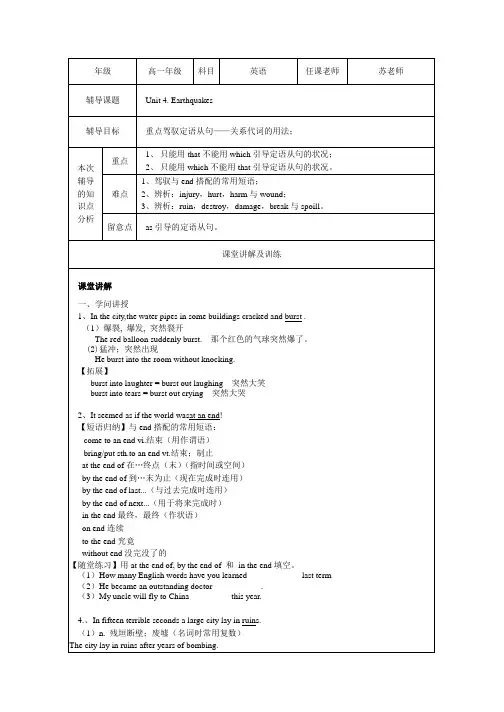
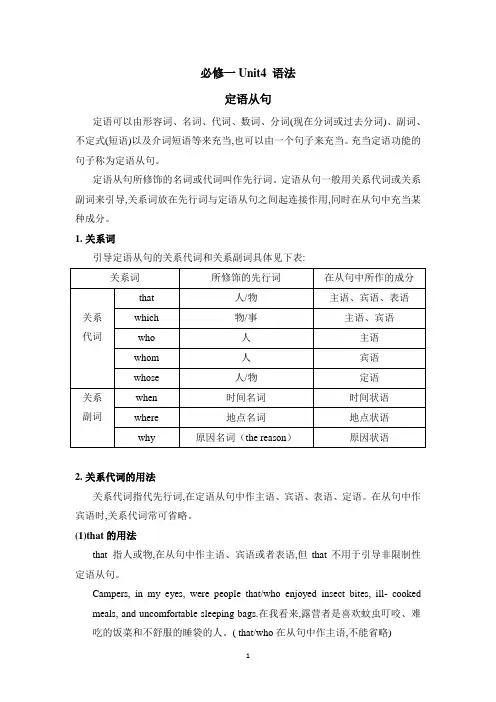
必修一Unit4 语法定语从句定语可以由形容词、名词、代词、数词、分词(现在分词或过去分词)、副词、不定式(短语)以及介词短语等来充当,也可以由一个句子来充当。
充当定语功能的句子称为定语从句。
定语从句所修饰的名词或代词叫作先行词。
定语从句一般用关系代词或关系副词来引导,关系词放在先行词与定语从句之间起连接作用,同时在从句中充当某种成分。
1.关系词引导定语从句的关系代词和关系副词具体见下表:2.关系代词的用法关系代词指代先行词,在定语从句中作主语、宾语、表语、定语。
在从句中作宾语时,关系代词常可省略。
(1)that的用法that 指人或物,在从句中作主语、宾语或者表语,但that不用于引导非限制性定语从句。
Campers, in my eyes, were people that/who enjoyed insect bites, ill- cooked meals, and uncomfortable sleeping bags.在我看来,露营者是喜欢蚊虫叮咬、难吃的饭菜和不舒服的睡袋的人。
( that/who在从句中作主语,不能省略)John is no longer the person ( that/who/whom) I knew five years ago.约翰不再是我五年前认识的那个约翰了。
(that/who/whom在从句中作宾语,可以省略) When the time came to make the final decision for a course , I decided to apply for the one that/which reflected my interest.到了最后决定修一门课程的时候,我决定申请那门能反映我兴趣的课程。
(that/which在从句中作主语,不能省略) The city is no longer the one ( that ) it used to be.这座城市不再是它原来的样子了。
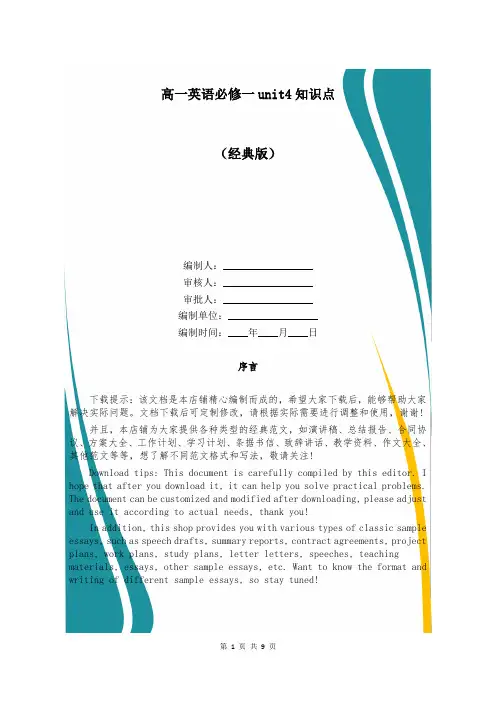
高一英语必修一unit4知识点(经典版)编制人:__________________审核人:__________________审批人:__________________编制单位:__________________编制时间:____年____月____日序言下载提示:该文档是本店铺精心编制而成的,希望大家下载后,能够帮助大家解决实际问题。
文档下载后可定制修改,请根据实际需要进行调整和使用,谢谢!并且,本店铺为大家提供各种类型的经典范文,如演讲稿、总结报告、合同协议、方案大全、工作计划、学习计划、条据书信、致辞讲话、教学资料、作文大全、其他范文等等,想了解不同范文格式和写法,敬请关注!Download tips: This document is carefully compiled by this editor. I hope that after you download it, it can help you solve practical problems. The document can be customized and modified after downloading, please adjust and use it according to actual needs, thank you!In addition, this shop provides you with various types of classic sample essays, such as speech drafts, summary reports, contract agreements, project plans, work plans, study plans, letter letters, speeches, teaching materials, essays, other sample essays, etc. Want to know the format and writing of different sample essays, so stay tuned!高一英语必修一unit4知识点知识能够被获得,并且因为它的本质,知识总是局部的,它永远都不是完整的,所以,一切源于知识的行动也都是局部的、不完整的。
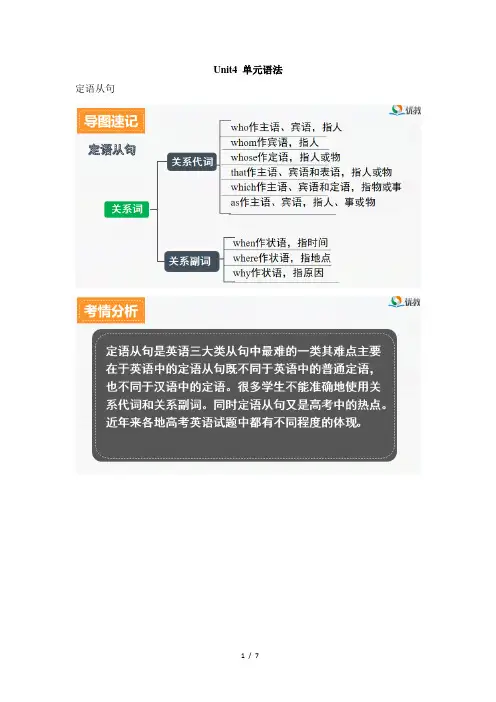
Unit4 单元语法定语从句形式担任定语功能的句子叫定语从句。
定语从句在句中的作用相当于形容词。
被定语从句修饰的名词或代词叫先行词;连接先行词与从句的词叫关系词。
感知①The Tangshan earthquake was a terrible experience that my grandma cannot forget.②He is the man who lives next door.③The supplies which were provided for the disaster area were collected from around the country.④Mr. Li is an architect whose designs for the new town of Wenchuan have won praise.⑤Jeffrey is not such d intelligent person as you think.①—⑤为关系代词引导的定语从句。
用法一、关系代词引导的定语从句1. who指人,在定语从句中作主语或宾语,作宾语时可省略。
The girl who answered the phone was polite enough.接电话的那个女孩很有礼貌。
(作主语)The professor (who) you wish to see has gone abroad.你希望见的那位教授出国了。
(作宾语)2. whom指人,在定语从句中作宾语,有时可省略。
He is the man (whom) you have been looking for.他就是你一直在找的那个人。
3. whose既可以指人,也可以指物,在从句中作定语。
This is the woman scientist whose name is known all over the country.这就是那位闻名全国的女科学家。
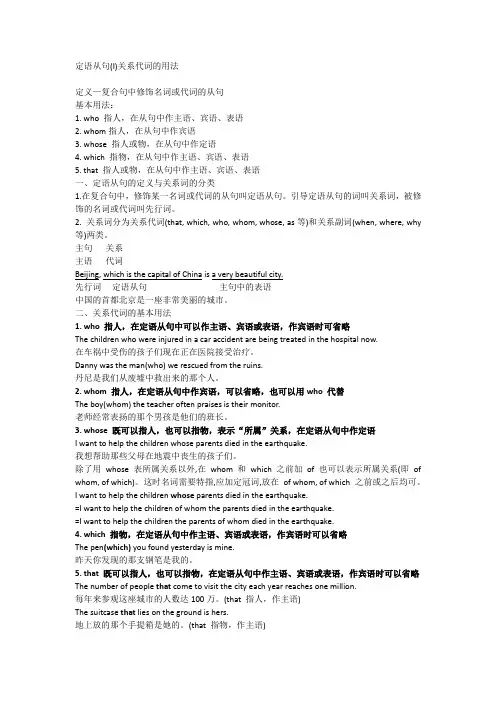
定语从句(I)关系代词的用法定义—复合句中修饰名词或代词的从句基本用法:1. who 指人,在从句中作主语、宾语、表语2. whom指人,在从句中作宾语3. whose 指人或物,在从句中作定语4. which 指物,在从句中作主语、宾语、表语5. that 指人或物,在从句中作主语、宾语、表语一、定语从句的定义与关系词的分类1.在复合句中,修饰某一名词或代词的从句叫定语从句。
引导定语从句的词叫关系词,被修饰的名词或代词叫先行词。
2. 关系词分为关系代词(that, which, who, whom,whose, as等)和关系副词(when, where, why 等)两类。
主句关系主语代词Beijing, which is the capital of China is a very beautiful city.先行词定语从句主句中的表语中国的首都北京是一座非常美丽的城市。
二、关系代词的基本用法1. who 指人,在定语从句中可以作主语、宾语或表语,作宾语时可省略The children who were injured in a car accident are being treated in the hospital now.在车祸中受伤的孩子们现在正在医院接受治疗。
Danny was the man(who) we rescued from the ruins.丹尼是我们从废墟中救出来的那个人。
2. whom 指人,在定语从句中作宾语,可以省略,也可以用who 代替The boy(whom) the teacher often praises is their monitor.老师经常表扬的那个男孩是他们的班长。
3. whose 既可以指人,也可以指物,表示“所属”关系,在定语从句中作定语I want to help the children whose parents died in the earthquake.我想帮助那些父母在地震中丧生的孩子们。
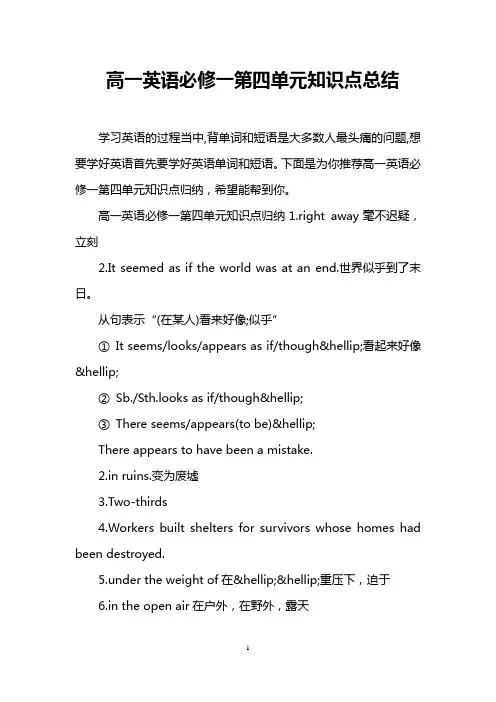
高一英语必修一第四单元知识点总结学习英语的过程当中,背单词和短语是大多数人最头痛的问题,想要学好英语首先要学好英语单词和短语。
下面是为你推荐高一英语必修一第四单元知识点归纳,希望能帮到你。
高一英语必修一第四单元知识点归纳1.right away毫不迟疑,立刻2.It seemed as if the world was at an end.世界似乎到了末日。
从句表示“(在某人)看来好像;似乎”①It seems/looks/appears as if/though…看起来好像…②Sb./Sth.looks as if/though…③There seems/appears(to be)…There appears to have been a mistake.2.in ruins.变为废墟3.Two-thirds4.Workers built shelters for survivors whose homes had been destroyed.5.under the weight of在……重压下,迫于6.in the open air在户外,在野外,露天7.take turns to do sth依次,轮流做某事in turn依次地,轮流地8.be shocked at对……感到震惊9.be proud of以……为自豪10.express one’s thanks to sb/for sth…对/因……表示感谢11.without warning毫无预兆12.next to紧接着,相邻,次于13.get away from…避免,摆脱,离开14.disaster-hit areas灾区15.Listening to English is a very important skill because it is only when we understand what is said to us that we can have a conversation with somebody.听英语是一项很重要的技能,因为只有当我们懂得别人给我们说什么我们才能与他交谈。
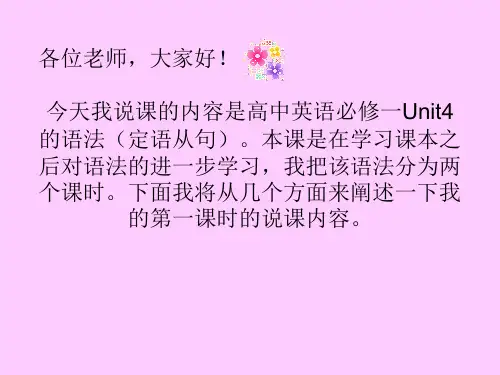
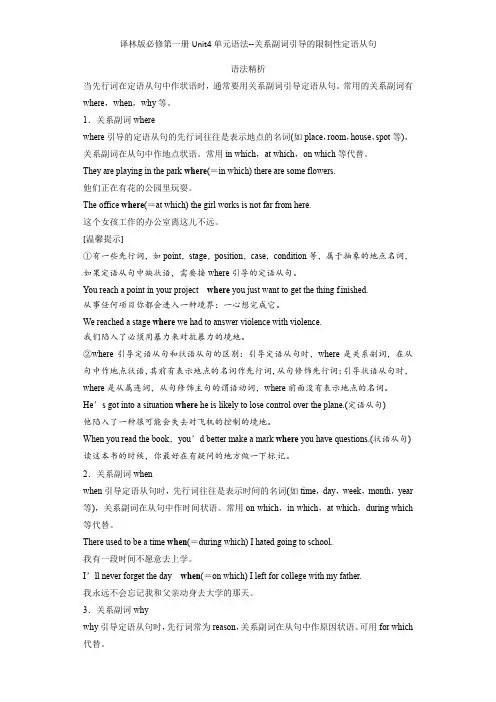
译林版必修第一册Unit4单元语法--关系副词引导的限制性定语从句语法精析当先行词在定语从句中作状语时,通常要用关系副词引导定语从句。
常用的关系副词有where,when,why等。
1.关系副词wherewhere引导的定语从句的先行词往往是表示地点的名词(如place,room,house,spot等),关系副词在从句中作地点状语。
常用in which,at which,on which等代替。
They are playing in the park where(=in which) there are some flowers.他们正在有花的公园里玩耍。
The office where(=at which) the girl works is not far from here.这个女孩工作的办公室离这儿不远。
[温馨提示]①有一些先行词,如point,stage,position,case,condition等,属于抽象的地点名词,如果定语从句中缺状语,需要接where引导的定语从句。
You reach a point in your project where you just want to get the thing f inished.从事任何项目你都会进入一种境界:一心想完成它。
We reached a stage where we had to answer violence with violence.我们陷入了必须用暴力来对抗暴力的境地。
②where引导定语从句和状语从句的区别:引导定语从句时,where是关系副词,在从句中作地点状语,其前有表示地点的名词作先行词,从句修饰先行词;引导状语从句时,where是从属连词,从句修饰主句的谓语动词,where前面没有表示地点的名词。
He’s got into a situation where he is likely to lose control over the plane.(定语从句)他陷入了一种很可能会失去对飞机的控制的境地。
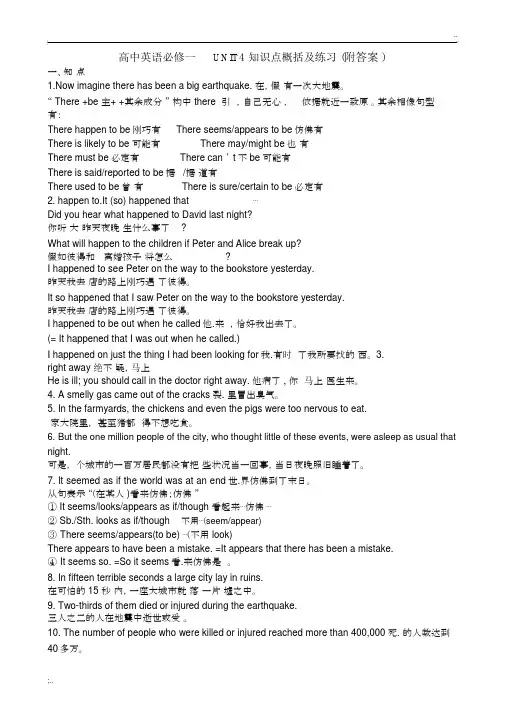
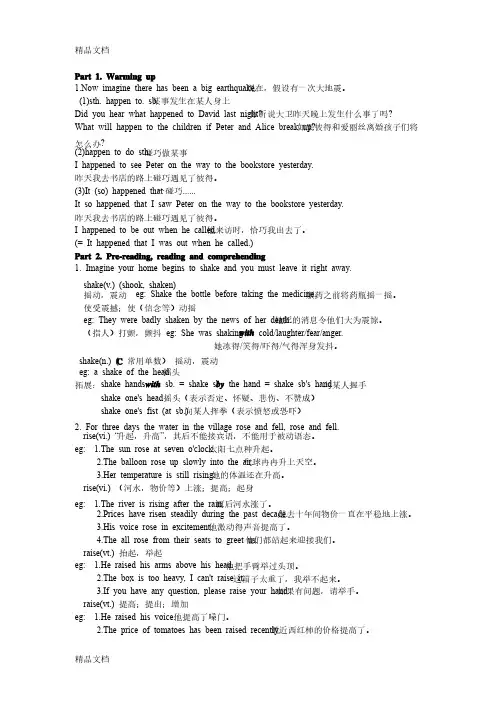
Part 1. Warming up1.Now imagine there has been a big earthquake. 现在,假设有一次大地震。
(1)sth. happen to. sb.某事发生在某人身上Did you hear what happened to David last night? 你听说大卫昨天晚上发生什么事了吗? What will happen to the children if Peter and Alice break up? 如果彼得和爱丽丝离婚孩子们将怎么办? (2)happen to do sth.碰巧做某事I happened to see Peter on the way to the bookstore yesterday. 昨天我去书店的路上碰巧遇见了彼得。
(3)It (so) happened that …碰巧...... It so happened that I saw Peter on the way to the bookstore yesterday. 昨天我去书店的路上碰巧遇见了彼得。
I happened to be out when he called. 他来访时,恰巧我出去了。
(= It happened that I was out when he called.) Part 2. Pre-reading, reading and comprehending1. Imagine your home begins to shake and you must leave it right away. shake(v.) (shook, shaken) 摇动,震动eg: Shake the bottle before taking the medicine. 服药之前将药瓶摇一摇。
使受震撼;使(信念等)动摇eg: They were badly shaken by the news of her death. 她死的消息令他们大为震惊。
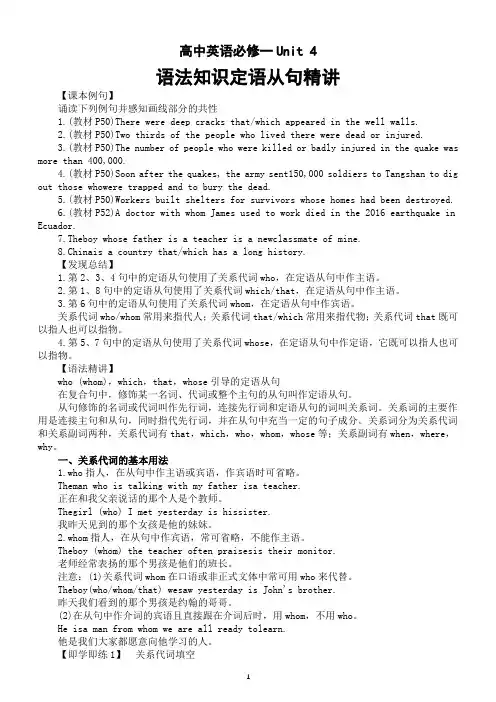
高中英语必修一Unit 4语法知识定语从句精讲【课本例句】诵读下列例句并感知画线部分的共性1.(教材P50)There were deep cracks that/which appeared in the well walls.2.(教材P50)Two thirds of the people who lived there were dead or injured.3.(教材P50)The number of people who were killed or badly injured in the quake was more than 400,000.4.(教材P50)Soon after the quakes, the army sent150,000 soldiers to Tangshan to dig out those whowere trapped and to bury the dead.5.(教材P50)Workers built shelters for survivors whose homes had been destroyed.6.(教材P52)A doctor with whom James used to work died in the 2016 earthquake in Ecuador.7.Theboy whose father is a teacher is a newclassmate of mine.8.Chinais a country that/which has a long history.【发现总结】1.第2、3、4句中的定语从句使用了关系代词who,在定语从句中作主语。
2.第1、8句中的定语从句使用了关系代词which/that,在定语从句中作主语。
3.第6句中的定语从句使用了关系代词whom,在定语从句中作宾语。
关系代词who/whom常用来指代人;关系代词that/which常用来指代物;关系代词that既可以指人也可以指物。
2023外研版高一英语必修一Unit4重点知
识
本文档将重点介绍2023外研版高一英语必修一Unit4的相关知识。
1. 单词和短语
本单元涉及的重点单词和短语包括:
- poverty:贫穷
- charity:慈善
- empathy:同理心
- gratitude:感激之情
- stereotype:刻板印象
- bias:偏见
- volunteer:志愿者
- optimism:乐观主义
2. 语法知识
本单元的重点语法知识有:
- 宾语从句:介绍如何使用宾语从句来表达他人的感受和态度。
- 特殊疑问句:研究如何使用特殊疑问词来构造疑问句,以获
取他人的意见和信息。
- used to和be used to:掌握used to和be used to的用法和区别。
3. 阅读和听力技巧
本单元的阅读和听力技巧包括:
- 掌握关键词和上下文推测词义的能力,快速理解文章和对话
的主题和要点。
- 注意细节,提高阅读和听力的准确性。
- 学会有针对性地提问以提高对文章和对话的理解能力。
4. 写作技巧
本单元的写作技巧有:
- 研究如何写一篇有关慈善的英文演讲稿。
- 掌握描述人物外貌和性格特征的表达方式。
- 学会使用恰当的连接词来连接句子和段落,使文章结构更加清晰和连贯。
5. 文化知识
本单元还将介绍一些与慈善和社会问题相关的文化知识,例如不同国家的慈善组织和相关的传统节日。
以上是2023外研版高一英语必修一Unit4的重点知识概述,希望对您有所帮助!。
Unit4 重点单词1. burst(1)vi 爆裂,爆发The balloon burst,and it surprised all the children.用法:burst out crying/laughing==burst into tears/laughter 突然哭/笑起来The sad mother burst (out crying)into tears,when the reporter asked a bout her son’s death in the big fire.burst into/in 闯进,突然破门而入Suddenly the children burst in/into the room.burst with anger/joy 勃然大怒/心花怒放(2)n. a burst of(爆发出)一阵......The burst of a balloon shocked all of us. There is a burst of applause from the crowd.2. at an end 介词短语,“终结结束”一般做表语。
The war is at an end.at the end of “在......的尽头,末尾,在......结束时”,后接时间,地点at the end of garden/this yearby the end of “到......为止”,后接时间,句子用过去完成时或将来完成时By the end of last month, we had finished half of it.in the end“最终,终于”,做状语They give up the plan in the end.come to an end结束,完成The journey was coming to an end.3. (1)n. lie/be in ruins 成为废墟After the flood, the village is in ruins now.come/go/fall to ruin 毁灭,荒废,崩溃The house was empty for several years and came/fell/went to ruin.bring sth/sb to ruin 使....毁灭/没落/破产The earthquake brought the city to ruin.(2) vt. ruin oneself自取灭亡ruin one’s health/fame 毁坏某人的健康,名誉Smoking ruined his health. His drunk driving not only ruined himself but also killed several passers-by.4. (1)injury n. 伤口,伤害do an injury to sb=do sb an injury Be careful,or you will do an injury to yourself. (2)injured adj. 受伤的,受委屈的the injured 伤员The driver was slightly injured in the accident. (3)injure vt. 损害,伤害Let him alone as long as he doesn't injure himself.5.(1) vi&vt.(使)震动,惊动be shocked at sh 对.......感到震惊He was shocked at the news.be shocked to do sth 做某事很震惊He was shocked to hear of the bad news.be shocked that.....对.......很震惊(2)adj shocked 感到震惊的,常表示人的心理状态和感受;shocking令人震惊的,说明事物的性质,特点He was shocked at the shocking new.(3)n. be a shock to sb使某人很震惊,对某人来说是个打击The bad news was a great shock to the whole family.6. come to one’s rescue=rescue sb 援救某人The rescue team came to his rescue.rescue ....from.... 把...从....营救出来She was rescued from a burning building.7.(1 )vt. trap sb into sth/doing sth诱骗,陷害某人做某事He trapped me into admitting I have done it.be trapped in 困在.....中,陷在.....中They are trapped in a difficult situation.(2)n. fall into the trap of 掉进......的圈套,陷阱set traps to do sth 设置圈套,陷阱做某事The owner of the house set traps to catch the mouse.8. bury.....in....把...埋在...;使.....沉浸于.....The dog buried its bone in the garden.bury oneself in(doing)sth= be buried in(doing)sth 埋头于,专心于,沉浸于某事He is burying himself/buried in studying.bury one’s face/head in... 把脸/头伸到....里去He sat down on the ground, and buried his face in his hands.10.(1)frighten sb into sth/doing sth把某人吓的做某事They frightened the boy into telling them the secret.be frightened at/by .....因....害怕He was frightened at/by the noise.他被这响声吓一跳。